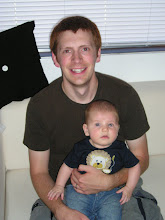When I tell people that I study economics usually their first comment is something like, "Oh, so when do you think the recession will end?" or "Do you think the national debt is too large?" If you were looking for a blog about these issues you will be disappointed. I always think it is a little funny when people ask these questions. These questions only concern one part of economics, macroeconomics. There is another side of economics, microeconomics. This is the more "fun" side of economics and my posts here will usually contain some principle from microeconomics. The ironic thing about those questions is that some economists don't even study macroeconomics and some even hate it. Although the do have a better understanding of those topics, they're probably not as qualified to answer those questions as much as people think.
This past weekend we went down to Bryce Canyon in southern Utah. My parents came down from Idaho along with my sister and brother-in-law (who is also studying econ). My other sister and her family came up from Arizona. With me moving to Oregon and my brother-in-law going to grad school next year this may be the last time that we are all together for a long time. I loved seeing my family, especially my sister from Arizona. Janelle remarried last year and I had not met her husband yet.

This was our first camping trip with Nathan. We were thinking it was going to be fun, but little did we know it was going to be one of the worst nights of our lives. As it got dark we huddled around the fire waiting for Nathan to go to sleep. Finally after the fire had almost gone out, he fell asleep. We went to our tent and put him in a bassinet that we had borrowed. A few minutes later he woke up. After some time he fell asleep again and she put him back in. He woke up again. This went on and on and on. He just would not fall asleep. Finally Heather turned to me and said were are going to the car and driving until he falls asleep. Nathan always falls asleep in the car, so I grabbed all of our blankets and threw them in the car. After about ten minutes of driving we pulled back into the camp site and tried to fall asleep in our car. About a minute later there was a flashlight shining in our windshield so I put up our sunshades. My dad had woken up and thought someone was messing with our stuff. After a few more minutes my dad went back to bed and so did we. I don't think we will go camping again for a while.
And now for a little bit of economics. My mom had stopped by my house on the way down to Bryce Canyon to borrow a game called Mind Trap to keep my dad awake. When I got there my mom shared a question that had stumped everybody even my brother-in-law Michael who thinks he's pretty smart. I blurted out some answer and got it wrong. The question was a trick question, but I will share a "non-trick question" version with you. "If it takes 6 men 6 days to paint 6 houses, how long does it take 1 man to paint 1 house?" What do you think, 1 day, 3 days, 6 days? If you answer was something like that you are wrong.
I admit I did the same thing. You have probably seen this type of question before and know that there is a way to solve it and come up with a correct finite answer, but I the people who write those questions and put them on IQ tests are mistaken. When we were driving home my mind drifted back to that question. It was then that I realized that I had been out of school and away from economics for too long.
The correct answer is that there is no way to tell with out more information. The only way to actually arrive at a finite conclusion is to make assumptions which may or may not be true. In fact they most likely are not true. First you would need to assume that the marginal product of labor is constant. What that means is that each extra worker increases that total production exactly as much as the previous. This is most likely not the case. Also we would need to assume something about the capital. It is possible that the six men were using some sort of new fangled painting devise that takes two men to operate, but paints houses at an alarming speed and one man alone can't do it. Of course that would mean that our previous assumption is false unless we define a unit of labor as two men.
The point of this story is that everyone should have a little understanding of economics. Many times, as in this example, people make incorrect economic assumptions without realizing it. This can be especially problematic when those people are in positions of power such as business leaders or politicians. Hopefully as you stay updated on my family you can learn a little about economics and I can why I enjoy economics so much.

